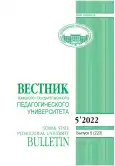DEVELOPMENT OF COGNITIVE INTEREST IN TEACHING MATHEMATICS TO SENIOR PRESCHOOLERS
- Authors: Pankov A.V.1, Gafiyatova O.V.1, Khramkova E.A.1
-
Affiliations:
- Kazan Innovative University named after V. G. Timiryasov
- Issue: No 5 (2022)
- Pages: 132-147
- Section: EDUCATION ISSUES
- URL: https://bakhtiniada.ru/1609-624X/article/view/268969
- DOI: https://doi.org/10.23951/1609-624X-2022-5-132-147
- ID: 268969
Cite item
Full Text
Abstract
About the authors
Aleksandr Vladimirovich Pankov
Kazan Innovative University named after V. G. Timiryasov
Email: pan2005@list.ru
ul. Moskovskaya, 42, Kazan, Russian Federation, 420111
Oksana Viktorovna Gafiyatova
Kazan Innovative University named after V. G. Timiryasov
Email: ogafiyatova@mail.ru
ul. Moskovskaya, 42, Kazan, Russian Federation, 420111
Elena Aleksandrovna Khramkova
Kazan Innovative University named after V. G. Timiryasov
Email: ehramkova@nzh.ieml.ru
ul. Moskovskaya, 42, Kazan, Russian Federation, 420111
References
- Федеральный государственный образовательный стандарт дошкольного образования: Приказ Минобрнауки России от 17.10.2013 г. No 1155 г. Москва // Российская газета «RG.RU». URL: http://www.rg.ru/2013/11/25/doshk-standart-dok.html (дата обращения: 20.01.2022).
- Трубайчук Л. В. Педагогическая энциклопедия: актуальные понятия современной педагогики / под ред. Н. Н. Тулькибаевой. М.: Восток, 2003. 274 с.
- Гризик Т. И. Познавательное развитие детей 2–8 лет: мир природы и мир человека: метод. пособие для воспитателей. 3-е изд. М.: Просвещение, 2017. 206 с.
- Савина Ф. К. Интегративные основы формирования познавательных интересов у дошкольников // Целостный учебно-воспитательный процесс: исследование продолжается (Методологический семинар памяти профессора В. С. Ильина). Волгоград: Перемена, Вып. 4. 1997. 44 с.
- Морозова Н. Г. Учителю о познавательном интересе. М.: Знание, 1979. 48 с.
- Щукина Г. И. Педагогические проблемы формирования познавательного интереса воспитанников. М.: Педагогика, 2004. 185 с.
- Денищева Л. О., Савинцева Н. В., Сафуанов И. С., Ушаков А. В., Чугунов В. А., Семеняченко Ю. А. Особенности формирования и оценки математической грамотности школьников // Science for Education Today. 2021. Т. 11, № 4. С. 113–135. doi: 10.15293/2658-6762.2104.06
- Hassidov D., Ilany B. S. A Unique Program (“Senso-Math”) for Teaching Mathematics in Preschool: Evaluating Facilitator Training // Creative Education. 2014. № 11. P. 976–988. doi: 10.4236/ce.2014.511112
- Sakakibara T. Mathematics Learning and Teaching in Japanese Preschool: Pro viding Appropriate Foundations for an Elementary Schooler’s Mathematics Learning // International Journal of Educational Studies in Mathematics. 2014. Vol. 1 (1). P. 16–26 doi: 10.17278/ijesim.2014.01.002
- Piaget J. Play, Dreams and Imitation in Childhood. New York: W. W. Norton and Company, Inc., 1962. 296 p.
- Piaget J. The Origins of Intelligence in Children. New York: W. W. Norton and Company, Inc., 1963. 420 p.
- Keller, Brian & Hart, Eric & Martin, W Gary Illuminating NCTM’s Principles and Standards for School Mathematics // School Science and Mathematics. 2001. Vol. 101. P. 292–304. doi: 10.1111/j.1949-8594.2001.tb17960.x
- Пьянкова Л. А. Организация работы по внедрению проектного метода в образовательный процесс дошкольного образовательного учреждения // Вестник Томского государственного педагогического университета. 2014. Вып. 11 (152). С. 140–146.
- Sriraman B., Lesh R. A Conversation With Zoltan P. Dienes // Mathematical Thinking and Learning. 2007. Vol 9. P. 59–75. doi: 10.1080/10986060709336606
- Dienes Z. P. Some thoughts on the Dynamics of Learning Mathematics in Brarath Sriraman (ed.) The Montana Mathematics Enthusiast Monograph 2, Zoltan Paul Dienes and the Dynamics of Mathematical Learning. Montana: The University of Montana Press, 2007. 172 p.
- Dienes Z. P., Seabourne P.L. The Six Stages in the Process of Learning Mathematics. Routledge, 1973. 64 p.
- Dienes Z. P. The effects of structural relations on transfer, (Psychological monographs on cognitive processes). Hutchinson Educational, 1970, 148 p.
Supplementary files






